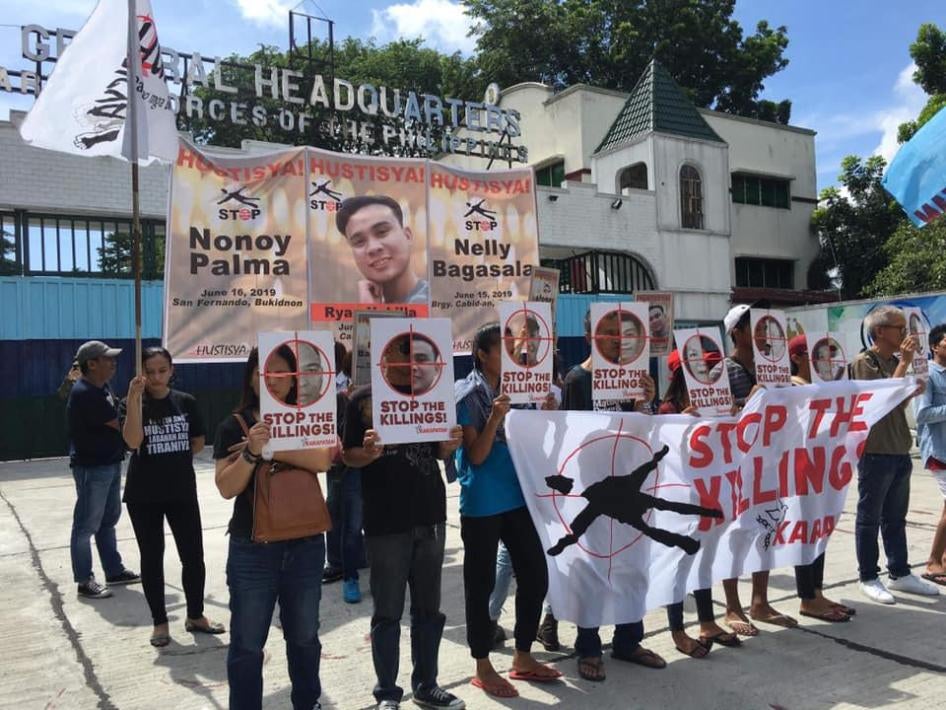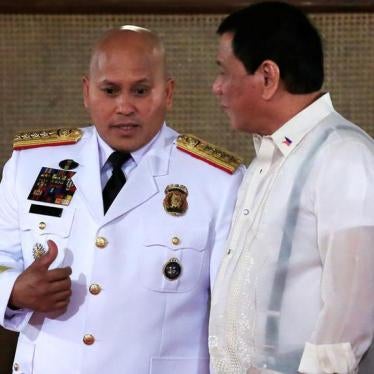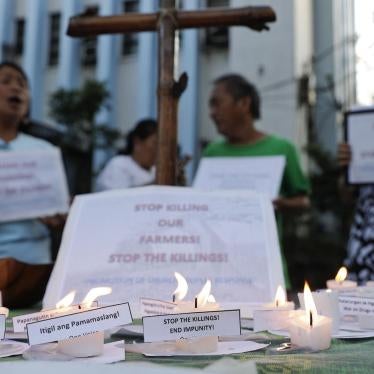(New York) The Philippine government should promptly and impartially investigate the recent spate of killings of leftist activists, Human Rights Watch said today. From June 15 to 17, 2019, unidentified gunmen fatally shot four members of leftist organizations. A labor organizer was also killed on June 2.
During the upcoming session of the United Nations Human Rights Council, scheduled to begin on June 24 in Geneva, United Nations member states should ensure an international investigation into the deteriorating human rights situation in the Philippines, including the thousands of unlawful killings under the Rodrigo Duterte administration’s murderous “war on drugs,” the killing of activists, and other serious human rights violations, Human Rights Watch said.
“The recent killings underscore that attacks on leftist activists is a serious human rights problem in the Philippines that has never gone away,” said Carlos Conde, Philippines researcher at Human Rights Watch. “The Philippine authorities should fully investigate these killings and bring those responsible to justice.”
On June 17, unidentified gunmen shot dead Neptali Morada in Naga City, Camarines Sur province on Luzon island. Morada, 40, was affiliated with Bagong Alyansang Makabayan (or Bayan), an alliance of left-wing organization, and was a former staff member of a local politician. A day earlier, gunmen on motorbikes shot Nonoy Palma, 57, a member of the Kilusang Magbubukid ng Pilipinas (Peasant Movement of the Philippines), in Bukidnon province on the southern island of Mindanao.
On June 15, gunmen killed Ryan Hubilla, 22, and Nelly Bagasala, 69, volunteers for the human rights group Karapatan in Sorsogon province on the southern tip of Luzon. On June 2, a gunman on a motorbike fatally shot Dennis Sequena, a labor organizer from Partido Manggagawa (Workers’ Party), as he met with workers in Cavite province, near Manila. Local groups confirmed with Human Rights Watch a number of details about the attacks.
In previous years, Human Rights Watch has documented the killing of numerous leftist activists, peasant leaders, and labor organizers. Many of these killings occurred in the context of the Philippine government’s 50-year-old armed conflict with a communist insurgency. Leaders of indigenous peoples, religious workers, and environmentalists have also been targeted.
Human Rights Watch and other rights groups have linked many of these killings to members of the military, police, or security force-backed militias. Very few of the killings of activists over the years have been seriously investigated, and hardly any have resulted in convictions. Often, the military and police accuse the victims of being either members or sympathizers of the Communist Party of the Philippines or its armed wing, the New People’s Army. Government officials have recently accused leftist groups that operate openly and legally of being communists, a label that can place their members at grave risk. Journalists and lawyers’ groups critical of the Duterte administration have also been subjected to this “red-tagging.”
The “drug war” killings in the Philippines which have continued unabated with near zero accountability require a long-overdue international investigation, and the attacks on leftist activists and other serious human rights abuses, including attacks against human rights defenders and civil society, should also be urgently scrutinized, Human Rights Watch said. On June 18, Philippine authorities said more than 6,600 people have been killed in the past three years during what they call legitimate police operations against drug suspects. However, nongovernmental groups as well as the national Commission on Human Rights estimate that the death toll is several times higher.
“UN member states should not let another session of the Human Rights Council go by without adopting measures that will put serious human rights violations in the Philippines under scrutiny,” Conde said. “It’s clear that Duterte’s administration will not credibly investigate abuses in the ‘drug war’ and against activists on their own.”









